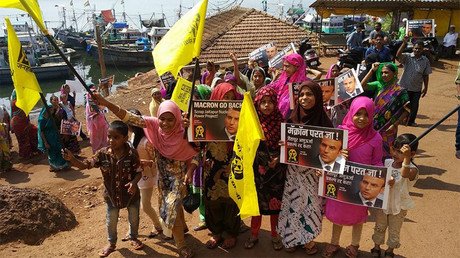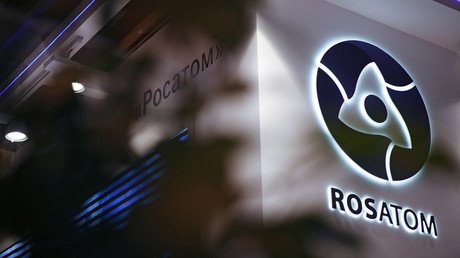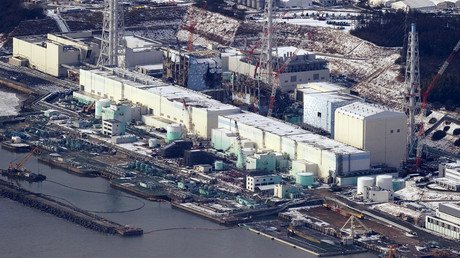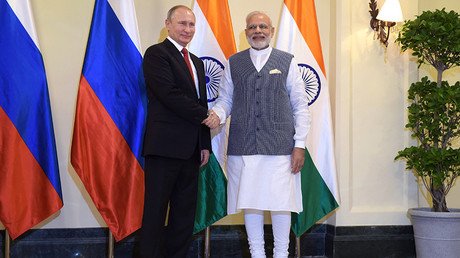‘Macron rolls out red carpet to woo Indian investors from UK to Europe’
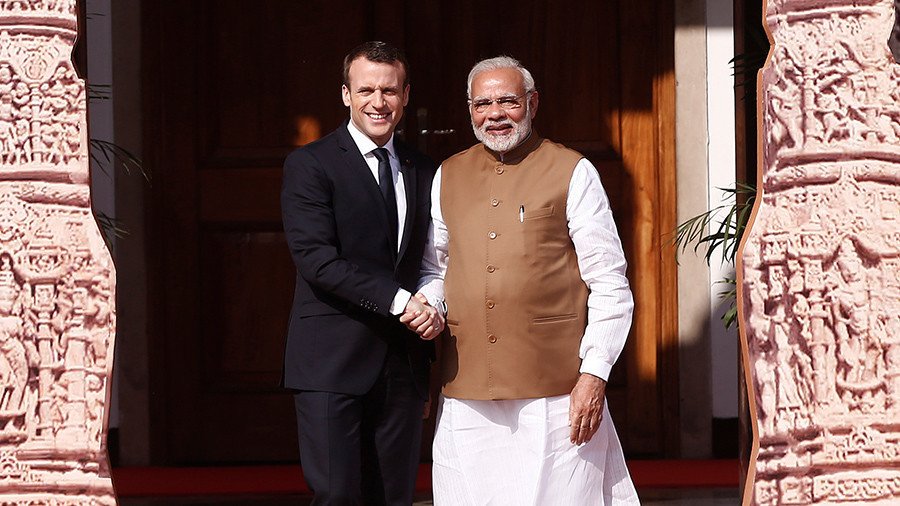
Emmanuel Macron believes France could replace Britain to become India’s gateway to Europe under Paris’ leadership in the EU after Brexit, says Dr Sreeram Chaulia, professor and dean of the Jindal School of International Affairs.
The French president is on a four-day visit to India. Despite the trip being hailed as a success by both sides, some protests were seen in the west of the country. Locals demonstrated against the building of a new nuclear power plant in Jaitapur, which is a joint project between India and France. The deal has raised safety concerns as the site lies in a seismically active region of India.
RT: How real are the safety and environmental concerns regarding the nuclear power plant?
Sreeram Chaulia: Nuclear power since the Fukushima disaster in Japan has generated a lot of environmental protests. Quite a few NGOs here in India are dead opposed to nuclear power. And even the Russian project in Kudankulam for the south, for another atomic reactor and power generation, had been opposed resolutely by some local groups that are left-leaning. I would still think that Jaitapur, the one which France and India are developing and which has just been agreed upon, is going to be overall beneficial for India’s economic development and its plans to move away from fossil fuels.
It is a bit of an irony that environmental groups are challenging nuclear power, even through it is relatively cleaner than coal, oil or gas. I think Prime Minister Modi and President Macron have agreed upon a very ambitious deal to promote solar energy. And I think solar and nuclear [power plants] are essential for India – one of the largest developing countries in the world – to move away from dependence on fossil fuels. So, it is a tough trade off – some local people have grievances about land and compensation, as well as environmental degradation.
To some extent, this may also have to revise the approach of the French and Indian governments because civil society is important and has to be taken along. Overall, the relationship with France is growing, [and] it is not just nuclear power – they have also agreed on Indian Ocean cooperation for a joint usage of military bases by the two navies, and there are also a host of other defense deals that have been discussed. So, it has become a more wide-ranging relationship. I don’t think the protests in Jaitapur will in any way pull back the two governments from proceeding ahead.
RT: Why was this exact location chosen, as it is known for being in a seismically active region?
SC: There are different evaluations of all the risks. Some are of the view that it is only a moderate seismic zone. And the chances of a Fukushima-type disaster are actually quite low. But then there are others who are saying they have to be absolutely safe and not take a chance at all. The point is, nuclear power requires coolants. And India has a large coast line. So, Kudankulam [nuclear power plant], which Russia is building for the south, and Jaitapur, which France is going to build, both of them are along the ocean and they have to be in coastal locations for water, for cooling the reactors. It is a difficult dilemma but, at the end of the day, the consensus is if we are reasonably secure and can provide some safeguards for local people and for the environment, [we will] be able to proceed ahead and look for the larger developmental needs of a growing economy like India, which right now has an energy mix that is heavily fossil-fuel dependent. We need to transition towards solar, wind and nuclear – I think in that order. These three are going to be very crucial for us to meet the Paris Climate Change commitments and also to be able to safeguard the air, water in the long run for all the people.
RT: What are Emmanuel Macron’s goals in reaching out to India?
SC: Emmanuel Macron is very ambitious, he believes that he can create or forge a kind of new EU that can stand up as a third power center in the world apart from China and the US. I think he is reaching out to India with a lot of hope for advanced fighter-jet sales for defense needs. And he also believes that he can displace Britain and become India’s gateway to Europe. He said it explicitly that the UK, because of Brexit, is no longer going to be so helpful for Indian companies and investors to reach the European common market. Therefore, he wants to attract and move away the Indian investors in the UK, which are quite sizable, onto the continent and into France. He is opening the red carpet to woo them. That has been one of the major purposes of his visit. And he thinks that, in the long run, the EU without Britain but with French leadership, and now that Angela Merkel is also not so strong because of the coalition in Germany, he thinks that he is going to be the leader of Europe, and he believes that he can offer that in talks and negotiations with major partner countries like India and China. That is the main purpose for him: to try and create a kind of opening for France to displace the UK as India’s main business partner in Europe.
